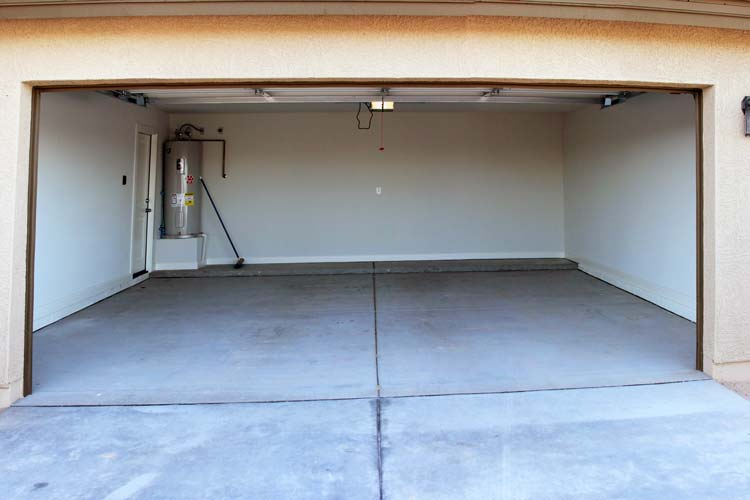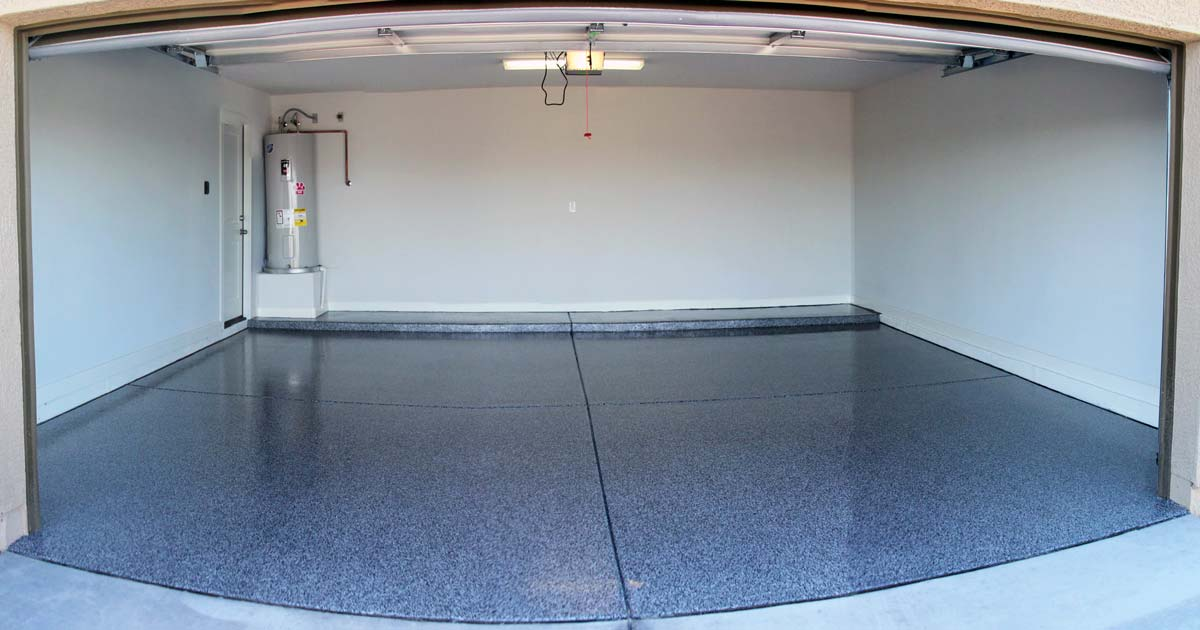How Much Does It Cost to Epoxy A Garage Floor?
Published 12/1/2024
If you're considering giving your garage a makeover, epoxy flooring is a popular choice. Not only does it enhance the look of your garage, but it also adds durability and makes cleaning easier. However, before diving into this project, it's essential to understand the costs involved and the factors that can influence those costs. This guide will walk you through what you need to know about the expenses related to an epoxy garage floor installation.
Key Takeaways
- The average cost for an epoxy garage floor ranges from $1,870 to $2,700.
- Costs vary based on garage size, existing concrete condition, and epoxy type.
- DIY projects can save money, but may require extra tools and effort.
- Professional installation ensures quality but can be more expensive.
- Customization options like metallic finishes and decorative flakes can increase costs.
Factors Influencing the Cost of Epoxy Garage Floors

When considering the cost of epoxy garage floors, several key factors come into play. Understanding these factors can help you budget effectively.
Size of the Garage
The size of your garage is one of the most significant factors affecting the overall cost. Larger garages typically require more materials and labor, which can increase expenses. Here are some points to consider:
- A small garage (around 250 sq. ft.) may cost between $750 and $3,000.
- A medium-sized garage (400-500 sq. ft.) can range from $1,200 to $6,000.
- Larger spaces often benefit from lower costs per square foot due to bulk purchasing of materials.
Condition of the Existing Concrete
The state of your existing concrete can also significantly impact the overall costs associated with your project. If the concrete is found to be damaged, cracked, or uneven, additional repairs may be necessary before applying the epoxy coating. When you work with us at Masonry of Medford, part of our free estimate is coming to your site, surveying the project's scope, and including the cost of re-leveling, filling cracks, and preparing your epoxy garage floor installation so that you don't have to worry about a thing. These are all crucial steps to achieve a durable and long-lasting finish. Oh -- and remember -- we serve all of New England!
- Filling cracks and holes.
- Ensuring the surface is capable of proper adhesion.
- Leveling the surface.
- Cleaning and preparing the area for application.
Type of Epoxy Used
Different types of epoxy come with varying price tags, which can significantly influence the overall cost of a project. For example, some epoxies are designed for specific applications, such as marine use or industrial settings, and these specialized formulations often come at a premium price due to their enhanced performance characteristics and durability.
- Water-based epoxy is generally the least expensive option.
- Solvent-based and solid epoxies can be more costly but offer different benefits.
- Specialty options like metallic epoxy can significantly increase the overall cost.
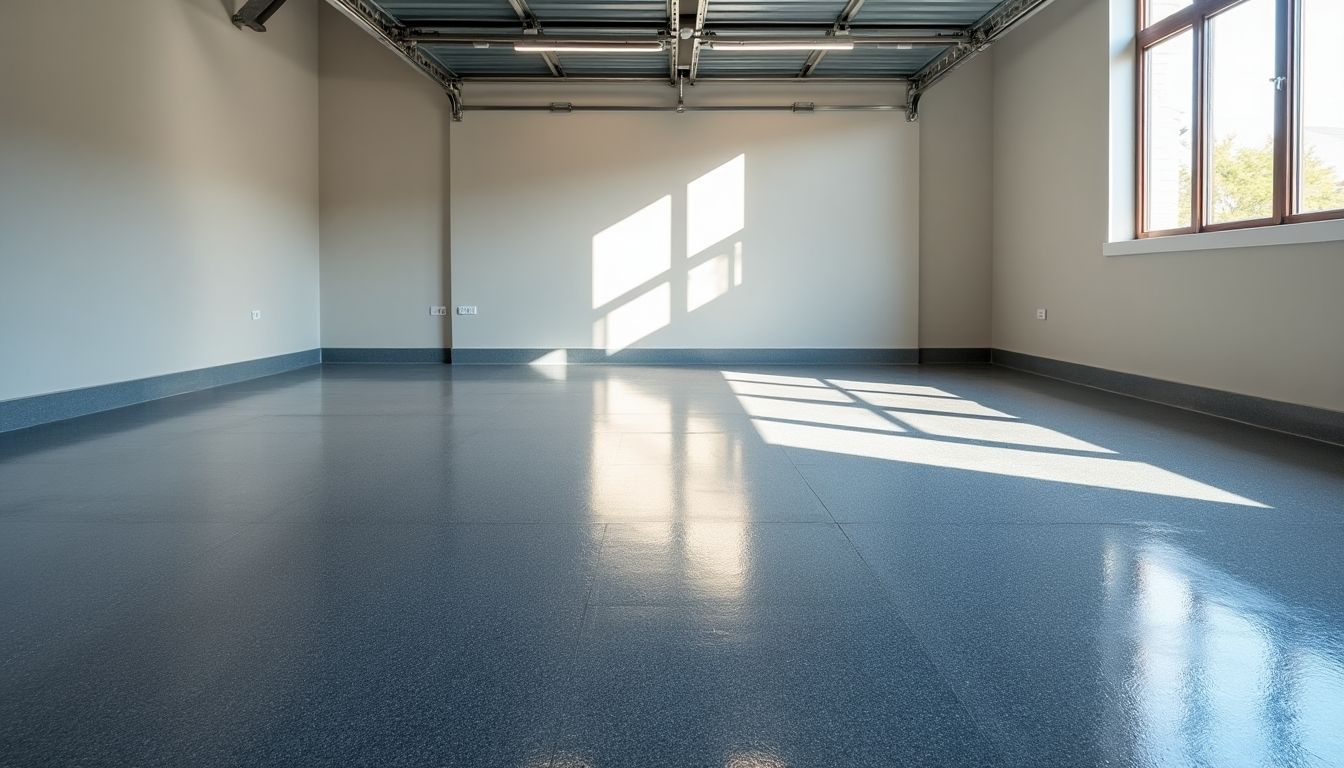
Labor Costs
Labor costs can vary widely based on location, including in Medford, MA, where the cost of living and local economic conditions play a crucial role in determining wages. The complexity of the job, whether it involves specialized skills or general labor, also significantly impacts the overall cost. Additionally, factors such as the local economy, which can be influenced by industry growth or decline, demand for labor, and the availability of skilled workers can significantly influence these costs.
On average, you might expect to pay a range of prices depending on these variables and the contractor's specific skills, which can fluctuate over time and across different regions, making it essential to conduct thorough research and obtain multiple quotes to ensure you are getting a fair price for the work required. Remember the old adage: "Do you want it done cheap, or do you want it done right?"
- Between $1 and $7 per square foot for labor.
- Additional costs for preparation work, which can add up to around $500 for a typical garage.
In summary, the size and condition of your garage significantly influence pricing. Larger spaces require more materials and labor, while floors in poor condition may need extra repairs before the epoxy can be applied. Understanding these factors can help you make informed decisions about your garage flooring project.
Understanding Different Types of Epoxy Coatings
When it comes to choosing an epoxy coating for your garage floor, there are several options available that cater to various preferences and requirements. Each type of epoxy coating has its own unique features, advantages, and potential drawbacks that can significantly impact the overall performance and durability of your garage floor. Understanding these differences in detail can help you make the best choice for your specific needs, ensuring that you select a coating that not only enhances the aesthetic appeal of your space but also provides long-lasting protection against wear and tear.
Water-Based Epoxy
- Water-based epoxy is easy to apply and clean up, making it a popular choice for DIY projects.
- It has lower levels of volatile organic compounds (VOCs), which makes it more environmentally friendly.
- However, it may not be as durable as other types.
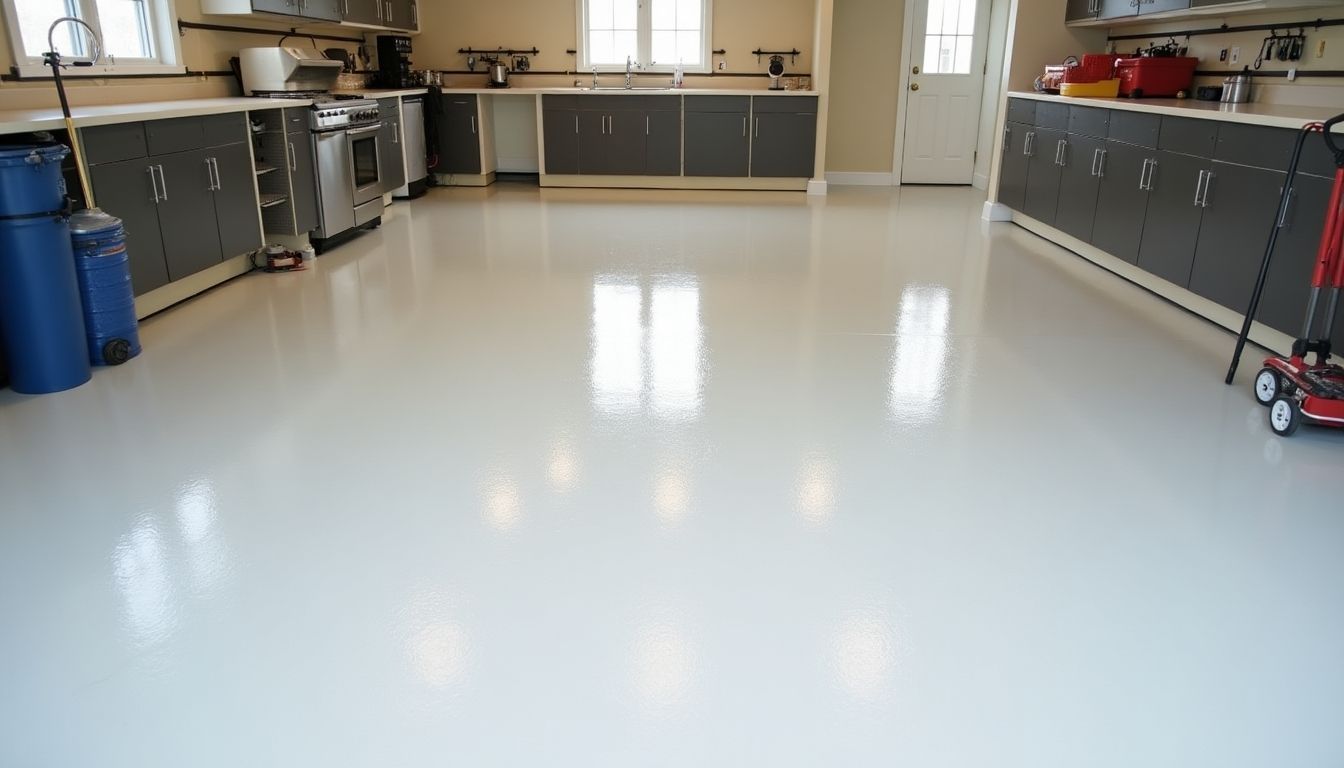
Solvent-Based Epoxy
- This type offers a strong bond and is highly resistant to chemicals and stains.
- It is ideal for high-traffic areas but has higher VOC levels, requiring good ventilation during application.
- Solvent-based epoxy is known for its glossy finish and long-lasting durability.
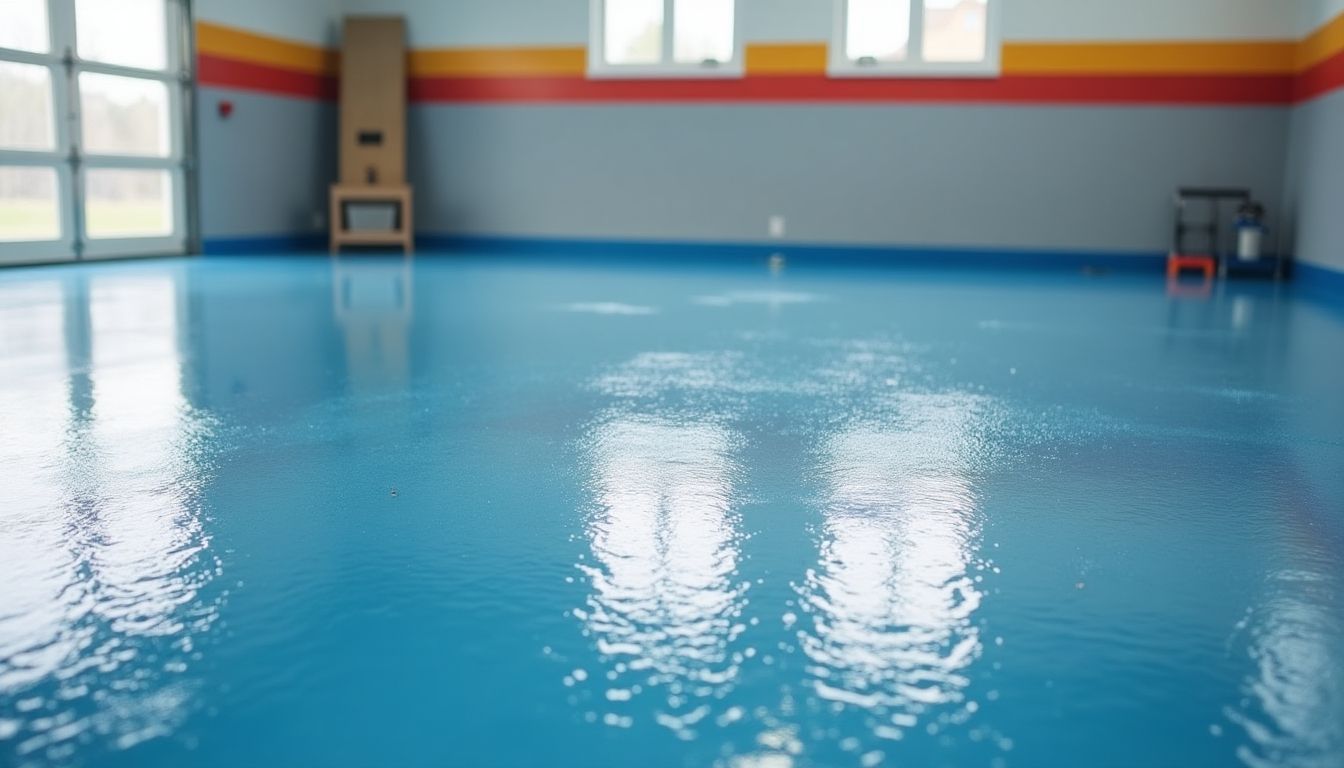
Solid Epoxy
- Solid epoxy coatings are thick and provide a robust surface that can withstand heavy loads.
- They are often used in commercial settings due to their strength and durability.
- This type can be more challenging to apply, often requiring professional installation.
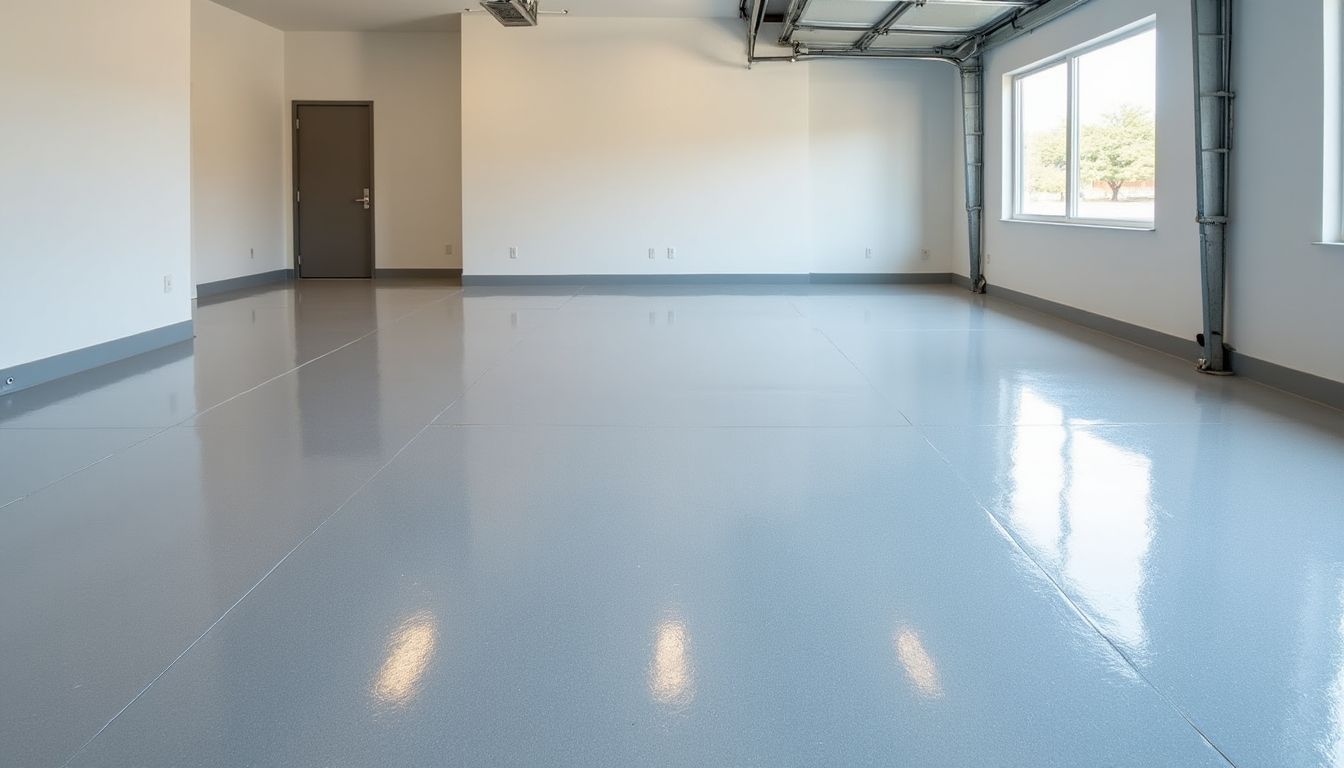
Metallic Epoxy
- Metallic epoxy creates a stunning, high-end look with a unique, shimmering finish.
- It is perfect for those looking to add a decorative touch to their garage floor.
- However, it can be more expensive and requires skilled application to achieve the desired effect.
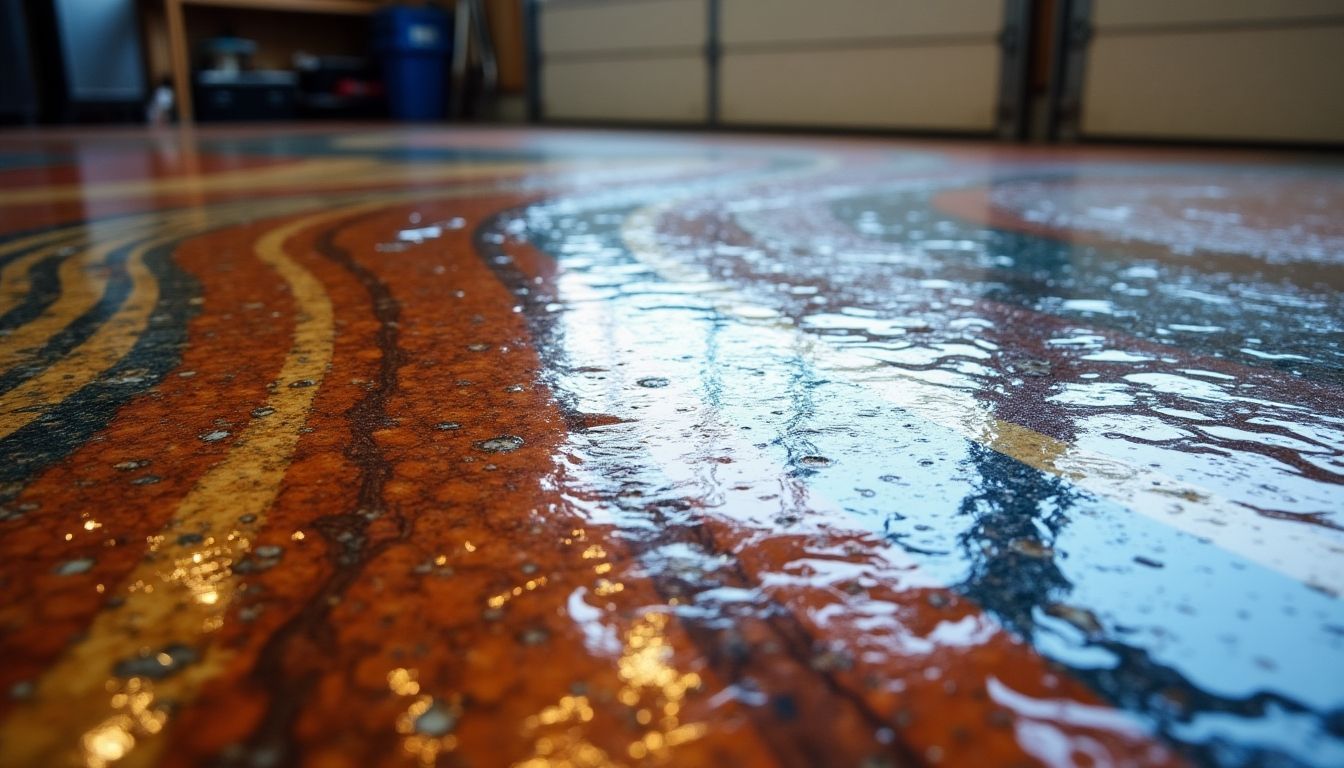
Epoxy coatings are incredibly tough and resistant to abrasion, chemicals, and impacts. They can withstand heavy foot traffic and vehicular loads, making them a great choice for garage floors.
DIY vs. Professional Epoxy Garage Floor Installation
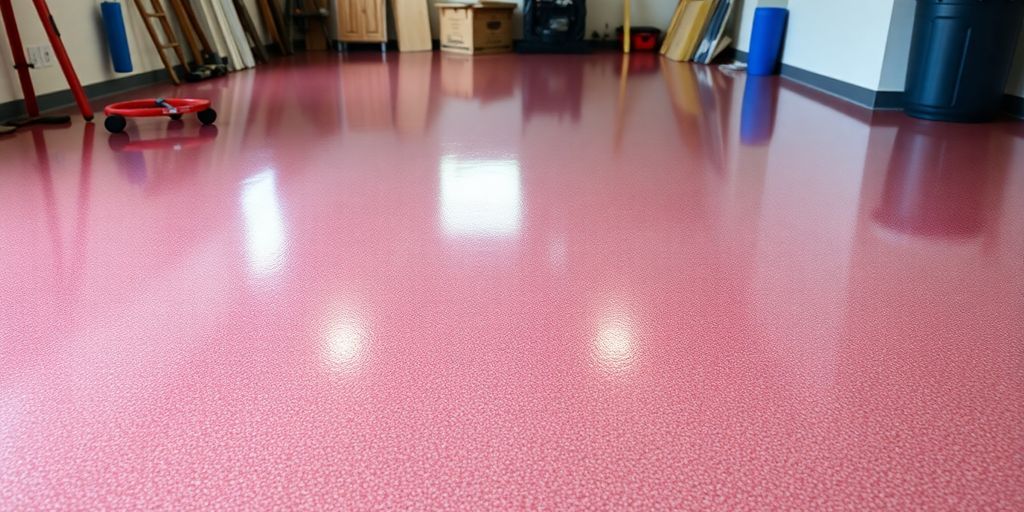
When considering whether to tackle your epoxy garage floor project yourself or hire a professional epoxy floor contractor, there are several factors to weigh. Choosing the right option can save you time and money.
Cost Comparison
- DIY Costs: You might think doing it yourself will save you money, but hidden costs can add up. You’ll need to buy or rent tools, and materials can be pricey.
- Professional Costs: Hiring a pro typically costs between $3 and $12 per square foot, which includes labor and materials. This might seem high, but it often covers unexpected expenses.
- Long-Term Value: Professionals usually provide a warranty, ensuring that the work lasts longer without needing repairs.
Time and Effort Required
- DIY Time: Expect to spend a weekend or more on a DIY project, especially if you’re new to this type of work.
- Professional Time: A professional can often complete the job in a day, allowing you to use your garage sooner.
- Physical Effort: DIY projects can be physically demanding, requiring a lot of lifting and moving.
Tools and Equipment Needed
- DIY Tools: You’ll need specific tools like a floor grinder, squeegee, and safety gear. If you don’t have these, renting can be costly.
- Professional Equipment: Professionals come equipped with all necessary tools, which can lead to a smoother installation process.
- Learning Curve: If you’re inexperienced, you might need to spend time learning how to use the tools effectively.
Pros and Cons
- DIY Pros: Lower initial costs, personal satisfaction, and flexibility in scheduling.
- DIY Cons: Risk of mistakes, potential for lower quality, and time-consuming.
- Professional Pros: Expertise, faster results, and high-quality finish.
- Masonry of Medford Pros: Decades of experience, faster results, all the hard work is done for you, the best epoxy floor money can buy.
- Professional Cons: Higher upfront costs and less personal involvement in the project.
If you decide to risk it on your own, here's a comprehensive and detailed epoxy flooring DIY video tutorial covering all the essential steps, tips, and techniques for achieving a professional-looking finish in your home or workspace, including an in-depth exploration of the necessary materials, tools, and safety precautions, as well as a step-by-step guide that illustrates the entire process from surface preparation to the final application, ensuring that even beginners can follow along easily and achieve stunning results that enhance the aesthetic appeal and durability of their floors. Just don't do this!
When it comes to deciding on the right way to epoxy your floors, choosing between DIY and hiring a professional can be a tough call. However, investing in the expertise of Masonry of Medford not only saves you time and effort but also ensures a flawless finish that you can be proud of. If you're feeling uncertain, reaching out to our skilled team can offer you the clarity and peace of mind you deserve. Call today for your free estimate!
Customization Options for Epoxy Garage Floors
Epoxy flooring provides a range of customization options that can enhance both the look and functionality of your garage. Here are some popular choices:
Decorative Flakes
- Add texture and color to your floor.
- Improve slip resistance, making it safer to walk on.
- Available in various colors to match your style.
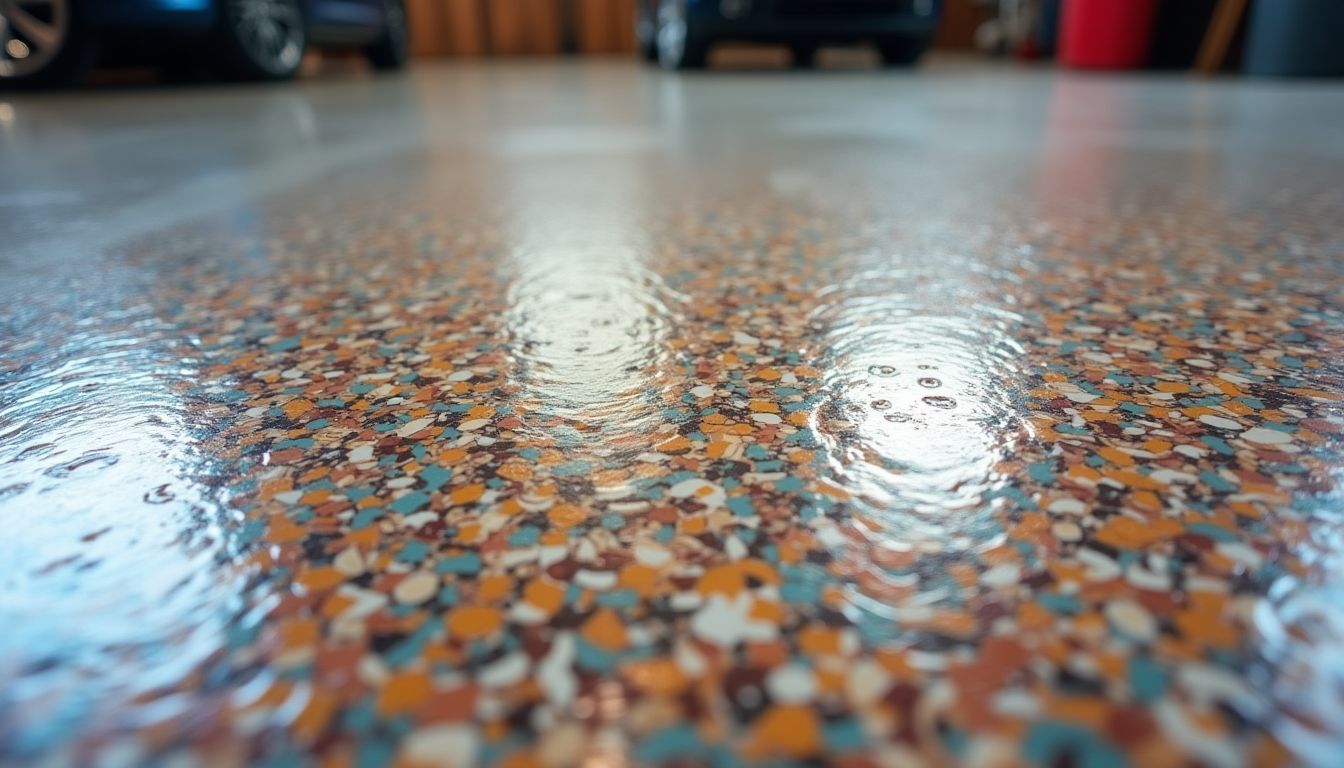
Metallic Finishes
- Create a stunning, shimmering effect.
- Ideal for those wanting a unique look, whether it's epoxy for your basement floor, a bar, or entertainment room.
- Not recommended for epoxy garage floors due to maintenance challenges.
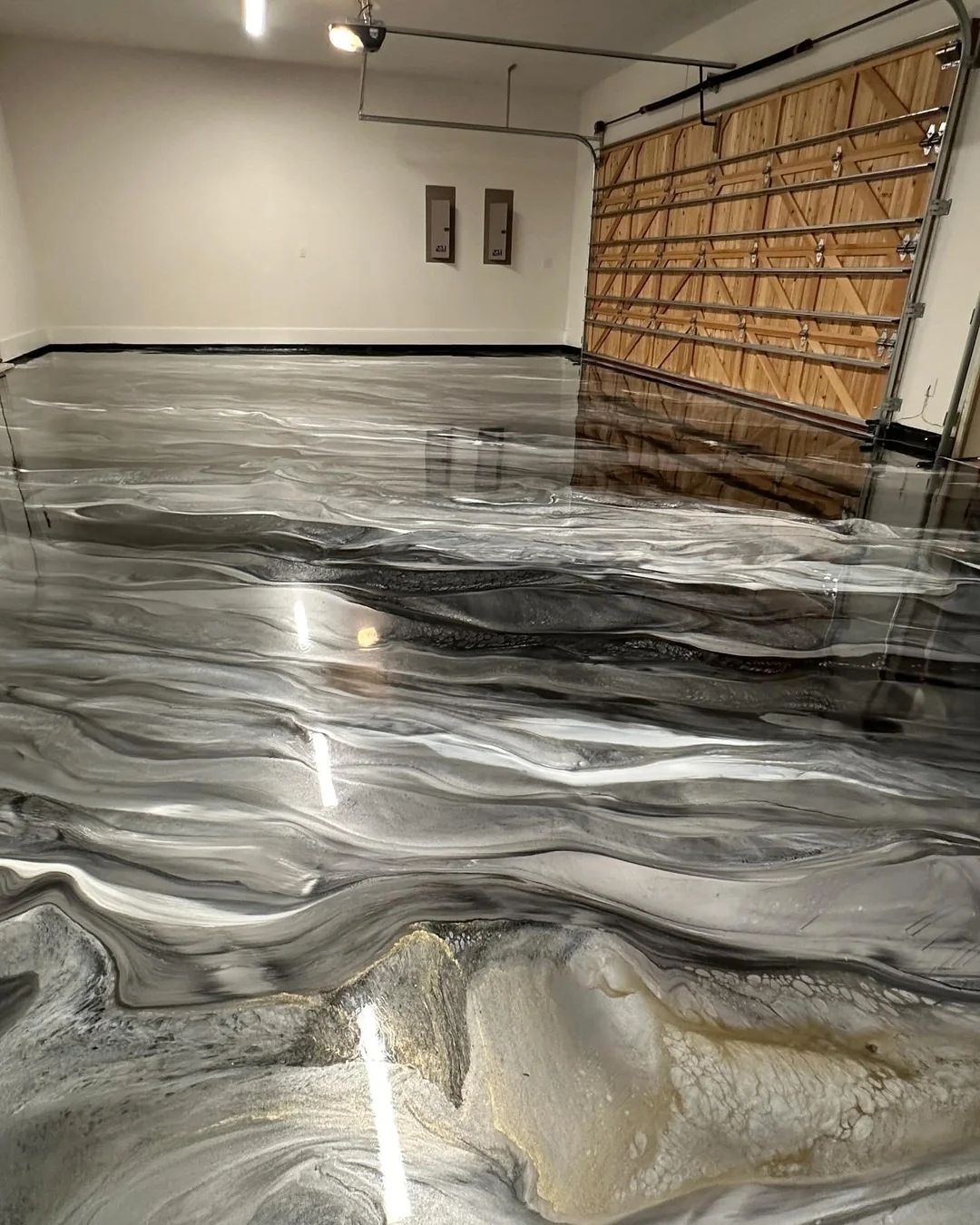
Quartz Broadcast
- Offers excellent slip resistance and durability.
- Provides a textured surface that is easy to clean.
- A great option for high-traffic areas.
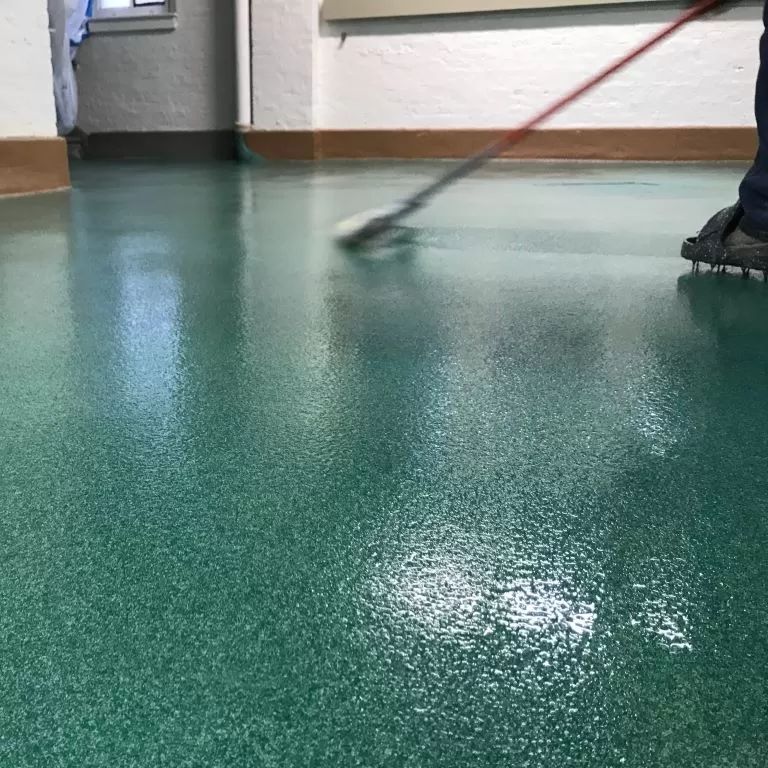
Solid Color Options
- A budget-friendly choice for those looking to save.
- Simple and straightforward, but may lack visual interest.
- Can be combined with other options for a more dynamic look.
Customizing your garage floor with epoxy can not only enhance its appearance but also improve its functionality. Consider your needs and preferences when choosing the right option for you!
Preparing Your Garage for Epoxy Flooring
Before you start applying epoxy to your garage floor, it’s essential to prepare the space properly. Preparation is key to ensuring a successful and long-lasting finish. Here are the steps you should follow:
Clearing the Garage
- Remove all items from the garage, including tools, boxes, and vehicles.
- Ensure the space is completely empty to allow for thorough cleaning and preparation.
- Consider using this time to organize or declutter your garage.
Repairing Cracks and Damage
- Inspect the concrete for any cracks or damage.
- Fill in any cracks with a suitable concrete filler to create a smooth surface.
- Allow the filler to cure completely before proceeding.
Surface Preparation Techniques
- Clean the floor: remove all dirt, dust, and grease from the concrete surface. This step is crucial for the epoxy to adhere properly.
- Etch the concrete with a mild acid to create a rough surface for better bonding.
- Scrub, vacuum, and rinse the floor thoroughly to remove any residue.
Preparing your garage floor properly can make a significant difference in the final outcome of your epoxy coating. Taking the time to do it right will save you from future headaches.
Safety Precautions
- Wear protective gear, including gloves and a mask, when working with cleaning agents and epoxy.
- Ensure proper ventilation in the garage to avoid inhaling fumes.
- Keep children and pets away from the work area during the preparation and application process.
By following these steps, you can ensure that your garage is ready for a beautiful and durable epoxy floor that will last for years to come!
Regional Cost Variations for Epoxy Garage Floors

Cost Differences by State
The cost of epoxy garage floors can vary significantly depending on where you live. For example:
- In New Hampshire, the average cost ranges from $3 to $15 per square foot.
- In Boston, MA, hiring a professional can cost around $5 to $15 per square foot for a typical garage.
- In some areas, costs can be as low as $3 or as high as $18 per square foot, depending on local demand and labor rates.
Urban vs. Rural Pricing
Costs can also differ between urban and rural areas. Generally, urban areas tend to have higher prices due to:
- Increased demand for services.
- Higher living costs.
- More specialized labor availability.
In contrast, rural areas may offer lower prices, but the availability of skilled labor can be limited.
Impact of Local Labor Rates
Labor rates play a crucial role in the overall cost of epoxy flooring. Factors affecting labor costs include:
- Local economy: Areas with a higher cost of living often have higher labor rates.
- Availability of skilled workers: A shortage of professionals can drive prices up.
- Complexity of the job: More intricate installations may require more skilled labor, increasing costs.
In summary, the cost of epoxy garage floors is influenced by various regional factors, making it essential to research local pricing before starting your project.
Long-Term Benefits of Epoxy Garage Floors
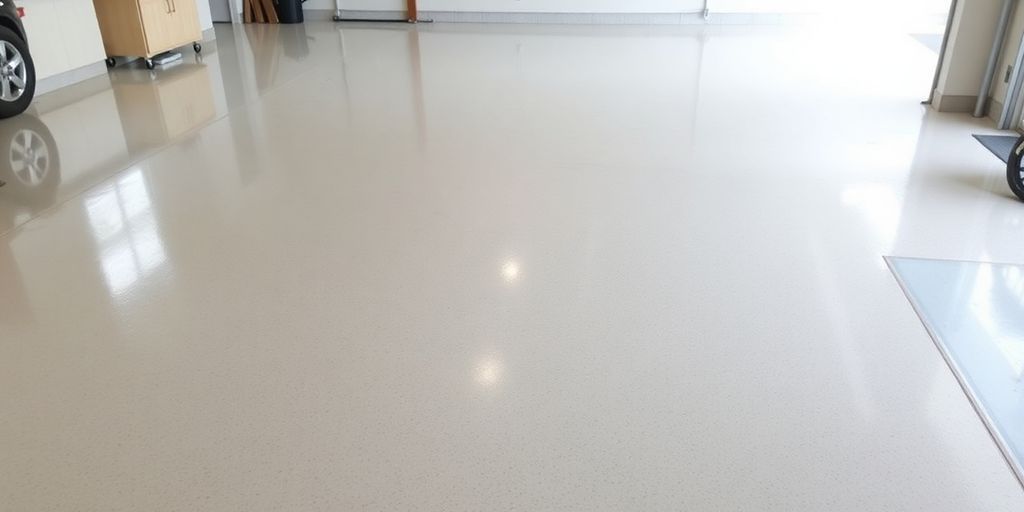
Epoxy garage floors offer several advantages that make them a smart choice for homeowners. Here are some key benefits:
Durability and Longevity
- Epoxy floors are incredibly tough, able to withstand heavy traffic and impacts.
- They resist stains, chemicals, and spills, making them easy to clean and maintain.
- With proper care, these floors can last for many years, making them a worthwhile investment.
Ease of Maintenance
- Cleaning epoxy floors is simple; a quick sweep and mop are usually enough.
- They do not harbor dust or allergens, promoting a healthier environment.
- Regular maintenance can keep them looking new for a long time.
Aesthetic Appeal
- Epoxy flooring can transform a dull garage into a bright and inviting space.
- The reflective properties of epoxy enhance lighting, improving visibility and reducing energy costs.
- Homeowners can choose from various colors and finishes to match their style.
Resale Value Enhancement
- Installing epoxy flooring can increase the overall value of your home.
- Potential buyers often appreciate the durability and low maintenance of epoxy floors.
- This upgrade can make your home more appealing in the real estate market.
Epoxy garage floors not only improve the look of your garage but also provide long-lasting benefits that can enhance your home's value and functionality.
In summary, the long-term benefits of epoxy garage floors include their durability, ease of maintenance, aesthetic appeal, and potential to boost resale value. Investing in epoxy flooring is a decision that pays off in the long run, making it a popular choice among homeowners.
Epoxy garage floors offer amazing long-term benefits that can transform your space. They are not only durable but also easy to clean and maintain, making them a smart choice for any garage. If you're ready to enhance your garage with a beautiful and lasting floor, visit our website today to learn more about our epoxy flooring services!
Final Thoughts on Epoxy Garage Flooring Costs
In conclusion, the cost of epoxy flooring for your garage can vary quite a bit. On average, you might spend between $1,870 and $6,00, but this can change based on the size of your garage and the condition of the concrete underneath. If you want to save some money, consider doing the prep work yourself, like moving items out of the garage.
Remember, while it might seem cheaper to do it yourself, hiring a professional can save you time and ensure a better finish. Overall, investing in an epoxy floor can make your garage look great and last for years, so it’s worth considering if you want to improve your space.
Frequently Asked Questions
What is the average cost to epoxy a garage floor?
The typical cost to epoxy a garage floor ranges from about $1,870 to $2,700, depending on factors like size and condition.
How long does an epoxy garage floor last?
An epoxy garage floor can last many years, often between 10 to 20 years, with proper care and maintenance.
Can I apply epoxy myself?
Yes, you can do it yourself, but it requires special tools and preparation. Many people choose to hire professionals for better results.
What are the benefits of epoxy garage flooring?
Epoxy flooring is durable, easy to clean, and resistant to stains and chemicals. It also looks great and can increase your home's value.
How do I prepare my garage for epoxy flooring?
You need to clear out the garage, fix any cracks, and clean the concrete surface thoroughly before applying epoxy.
Are there different types of epoxy coatings?
Yes, there are several types, including water-based, solvent-based, solid, and metallic epoxy, each with different costs and features.
Why Choose Masonry of Medford for Masonry Services?
- Expert Craftsmanship: Our skilled masons bring years of experience and attention to detail, ensuring durable and beautiful results.
- Custom Solutions: We tailor every project to your specific needs, creating custom designs that match your style and vision.
- Quality Materials: We use only the finest materials to ensure long-lasting and visually appealing structures.
- Comprehensive Services: From new construction to masonry repairs and restorations, we handle all aspects of masonry work.
- Local Expertise: As a local business, we understand Medford’s unique requirements, ensuring practical and beautiful projects.
- Customer-First Approach:
Your satisfaction is our priority. We work closely with you from start to finish, exceeding expectations.
Why Choose Masonry of Medford for Concrete Services?
- Experienced Professionals: Our team of concrete contractors brings extensive experience and expertise to every concrete project, ensuring top-notch results.
- Quality Materials: We use only the best concrete materials and techniques, ensuring your driveways, patios, foundations, and repairs are built to last.
- Custom Solutions: We work closely with you to design and construct concrete features that meet your specific needs and enhance your property’s aesthetic.
- Customer Satisfaction: We prioritize your satisfaction, delivering exceptional service and results that exceed your expectations.
- Local Knowledge: As a Medford-based company, we understand the specific challenges and requirements of our local climate, ensuring your concrete projects are durable and effective.
GET YOUR FREE ESTIMATE TODAY
Are you tired of dealing with unprofessional and unreliable concrete contractors? Look no further than Masonry of Medford. Our team of experts is dedicated to providing superior quality concrete services, from pouring and leveling to stamping and staining. Let us exceed your expectations and bring your concrete vision to life. Hire us today and experience the difference a dedicated and driven team can make.
QUICK LINKS
COMPANY INFO
Masonry of Medford
4000 Mystic Valley Pkwy, Medford, MA 02155, United States of America
781-399-8607

